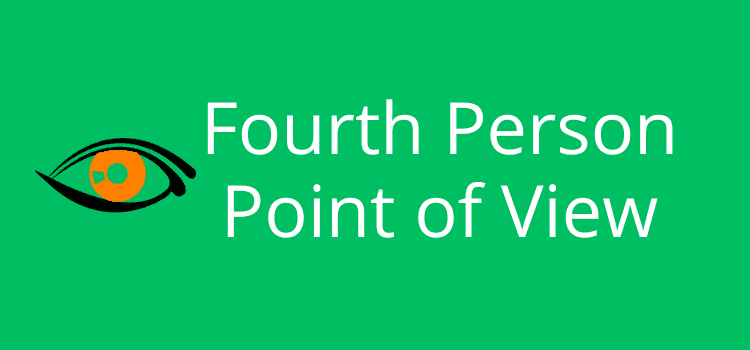
The fourth person point of view (POV) is not necessarily new, but it is still rare to see it in writing.
All writers are familiar with the first, second, and third person points of view. They are pretty much the standard ones we use in most forms of writing.
But the fourth allows a writer to narrate from the perspective of a group or collective using the pronouns we and us.
It can also be a tool to use indefinite instead of personal pronouns, such as someone or anyone.
The fourth person point of view explained
Points of view in writing are defined by their pronouns.
The first person uses I, my, me, we, and us, while the second uses you and your.
But the most popular for storytelling is the third person, which uses he, she, they, and it.
However, the fourth person uses only the plural pronouns we, us, our, and ours, which are usually associated with the first person.
That makes it challenging because any use of the singular pronouns immediately reverts the text to the first person.
Here’s a quick example to illustrate the difference.
Our goal was to sell one hundred jars of jam at the market, and we achieved our goal. (Fourth POV)
Our goal was to sell one hundred jars of jam at the market, and I helped achieve our goal. (First POV)
You can see that it’s easy to slip up by using I and returning to the first person.
Let’s look at the possible uses for this point of view.
Storytelling from a group’s perspective

Writing a story from the viewpoint of a couple, a team, or a group is the ideal use.
The narrator in a story reflects the views and opinions of the group.
Perhaps in the case of a memoir about a couple, the narration would always be from both.
We met in 2005 while we were on vacation in Spain.
But we didn’t expect in our wildest dreams that it would be a life-changing event for both of us.
However, it makes it challenging when you want to write about only one of the couple or group.
That would mean sliding back into the first person POV.
To avoid this, you could use the pronoun, one.
Our first child was born in 2010, and I was so proud to become a parent.
Our first child was born in 2010, and one must say how proud it was to become a parent.
You can see why this is a demanding point of view and rare to see in writing.
But it is not a tool you would use for a long story.
Perhaps the best application is to use it in one chapter to set the scene for the rest of the book.
The indefinite fourth person
The difference in this view is that it only uses indefinite pronouns.
They are:
Anyone
Anybody
One
Oneself
One’s
Someone
Somebody
It’s a form that is only useable for passages and not for a whole story.
The most common use is to avoid the passive voice by adding someone or somebody as the subject.
One is in disbelief when waking up to find no car in the driveway. Someone stole it during the night, which now means a day one loses making reports to the police and insurance company.
Yes, it can be a bit awkward, but it can have some specific uses.
Examples from literature
While it’s not a popular choice, some books use the fourth-person point of view.
Here are a few short quotes.
A Rose for Emily by William Faulkner
We believed she had to do that. We remembered all the young men her father had driven away, and we knew that with nothing left, she would have to cling to that which had robbed her, as people will.
Weightless by Sarah Bannan
We watched her miniature frame as she tumbled across the track – she was no more than five foot two.
Anthem by Ayn Rand
When we were five years old, we were sent to the Home of the Students, where there were ten wards, for our ten years of learning.
Trying your hand at the 4th person
There are many literary devices, but I always struggle with this one.
Knowing the structure is one thing, but applying it is another.
If you want to try it, the best way is to experiment with a short story.
But stay with we, us, and our because it is much easier than trying to use the indefinite form.
You are probably comfortable writing in the first, second, and third points of view.
But it doesn’t hurt to experiment and push yourself a little by trying something new.
All you need to do is decide on your narrators. Are they two people, a group, a political party, or a sporting team?
Once you decide, it becomes a little easier to write.
Can you write a book in the fourth person?
Books written in the fourth person point of view are a bit of a rarity.
Perhaps because of the difficulty or maybe because of readers’ expectations.
It could also be reluctance by publishers to take a gamble.
There’s nothing to say you can’t do it, but be aware of the obstacles and maybe the ordeal of writing a book in this POV.
However, interchanging it with the first person point of view would be much easier to write.
It’s interesting to note that some writers believe there is no fourth person POV, as it is merely a new name for the first person plural.
I’m sure it is a debate that will continue.
Conclusion
Never say never, but I doubt I would ever try to write a novel in the fourth person.
With the other three points of view, maintaining consistency is never a problem.
However, with the fourth person, it’s a struggle to stay on top of it. There’s always the temptation of, or accidentally, using first person pronouns.
We had a plan to win, and luckily it all came off for us, and I was so pleased to be part of it.
But there’s nothing wrong with that.
Yes, you could use one instead of I, but would it make it read better? I doubt it.
In the end, it is about knowing it’s there if you need it.
Use it when it works, but don’t think that you have to stay stuck in the fourth person for an entire story.
Related Reading: How To Use The Second Person Point Of View In Writing



